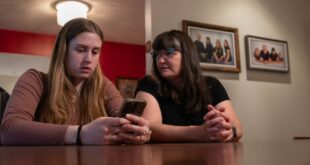'I don't have a lot of expectations of finding a doctor,' says former patient
.jpg?crop=1.777xh:h;*,*&downsize=510px:*510w)
Why the retirement of 2 English doctors in Quebec City is a concern for Anglophone community
23 hours ago
Dr. Alec Cooper and Dr. Mary Delafield are both retiring just months apart. That's worrying some patients, who wonder whether they'll be able to find another English-speaking doctor.
When Dr. Alec Cooper started having difficulty buttoning his shirt and using medical instruments last year, the Quebec City-based family physician never thought it would mark the beginning of the end of his career.
"My own family doctor assumed that it was just a pinched nerve in my neck," said Cooper, 66, sitting on his couch in his family home.
"Finally my diagnosis came, which was a huge shock."
In November, Cooper found out it was ALS, a fatal motor neuron disease.
"It means that I may not have that much more time to live … I think it's a lot tougher on my wife, unfortunately," said Cooper, holding back tears. "She's preparing for a life alone."
Cooper also worried about his 1,800 patients and how they would cope.
The anglophone doctor, originally from Victoria, had a full patient load and, before announcing his snap retirement, tried to figure out how he could help prevent his patients — many of them anglophones — from falling through the cracks of an overburdened public health-care system.
"I was just really panicking," said Cooper.
"I was terribly torn. I have very close relationships with a lot of patients and that makes me sad.… All the doctors are stretched."
2 doctors retiring months apart
Marilyn Dolan, a former patient of Cooper, says she was "flabbergasted" by the news.
"[I] kind of couldn't believe it," said Dolan. "What do you do if you get seriously ill and you don't have a family doctor assigned to you? Like, I don't even know what that road looks like but from where I sit, it doesn't look very rosy at all."
She says having a doctor who spoke to her in English and went the extra mile was "worth its weight in gold."

Cooper's retirement comes just months before that of Dr. Mary Delafield.
An anglophone from Montreal, Delafield has practised family medicine since 1992 in Quebec City. She says she's been notifying patients over the past year and plans to fully step back in five months.
"Family practice is getting harder and harder and we seem to be often blamed by the powers that be for many of the woes of the medical system and it starts to feel burdensome," said Delafield.
She says that as far as she knows, there are no other anglophone family doctors in the city, an assertion shared by Cooper.
"If there are, they're probably in the same situation as I have been for the last little while."
She says she has been working at capacity and was unable to take on new patients.
When Delafield retires, another 1,200 patients could be without a doctor.

Richard Walling says these two retirements represent a significant loss for the anglophone community. Walling is the executive director of Jeffery Hale Community Partners, a non-profit that helps anglophones access health and social services in Quebec City.
"We now have quite a few people out there who are now orphans, as we call them," said Walling.
Request for English interpreters more than tripled since 2019
While there might be plenty of French doctors who speak English, Walling says it's unclear who is able to offer bilingual services. Like Cooper and Delafield, he believes they were the last two anglophone family doctors in the city.
The English-speaking community in Quebec City is also growing, says Walling, with a total of 17,000 people.

The health authority offers interpreters at the request of physicians or the organization providing care, and according to data from Quebec City's health authority, the number of requests for English interpreters more than tripled since 2019.
"Access to service in your language is a determinant of health," said Walling.
Walling says seeing a doctor you can talk to is a foot in the door of the health-care system and a way to ensure that medical problems are caught early on.
Anglo patient feels 'under attack'
The inability to find another English-speaking doctor is part of why Jill Gagnon wants to leave the province.
An American, Gagnon moved to Quebec City from the Bahamas 20 years ago with her husband. She now finds herself among the former patients of Dr. Cooper who have been left scrambling.

"I'm a balloon floating in the air right now," said Gagnon.
"I don't have a lot of expectations of finding a doctor. In fact, I think it's probably quite a bit easier to get Taylor Swift tickets than find a doctor in Quebec."
Gagnon says she has become strong in French over her past two decades, but advocating for herself or her children in her second language is still a hurdle.
"Returning something to Walmart or getting your teeth cleaned in French is not the same thing," said Gagnon.
"There are going to be moments where I'm going to be very frustrated and not wanting to speak French."
Right now, she says she's out of options, and if her health declines, she might have to choose private health care.
"I'm paying taxes for a health-care system that isn't serving me," said Gagnon.
"I feel very much under attack in this province just for being an anglophone … I feel like now when I probably need it most [the] health-care system will fail me."
She says it's a load that Cooper — and the few anglophone doctors in Quebec City — shouldn't have to carry.

Cooper would have stayed
If all had gone to plan, Cooper says he would have stuck around for a few more years.
"When this diagnosis came up, that sort of changed a lot of things," said Cooper
Despite being retired, Cooper still finds himself taking patients' calls on an exceptional basis. And he says his office continues to be overwhelmed with questions.
"My secretary said, 'They keep calling,'" said Cooper.
"So I said, 'Well listen, the next one who calls just just tell them, look, pretend Dr. Cooper was run over by a car or he had a heart attack. That's your situation.'"
*****
Credit belongs to : www.cbc.ca
 MaharlikaNews | Canada Leading Online Filipino Newspaper Portal The No. 1 most engaged information website for Filipino – Canadian in Canada. MaharlikaNews.com received almost a quarter a million visitors in 2020.
MaharlikaNews | Canada Leading Online Filipino Newspaper Portal The No. 1 most engaged information website for Filipino – Canadian in Canada. MaharlikaNews.com received almost a quarter a million visitors in 2020.







